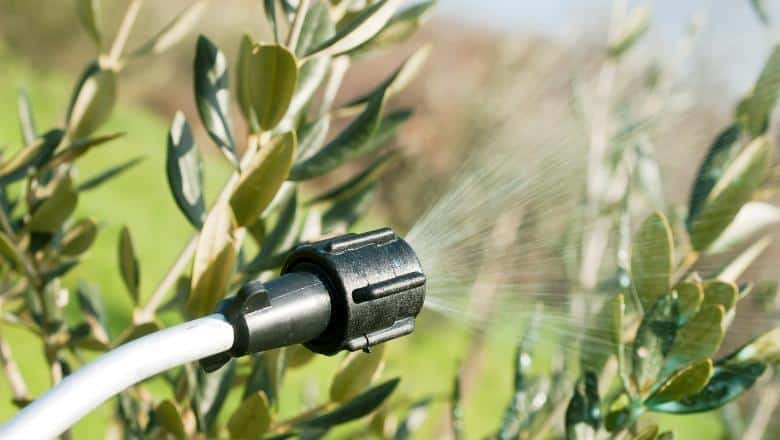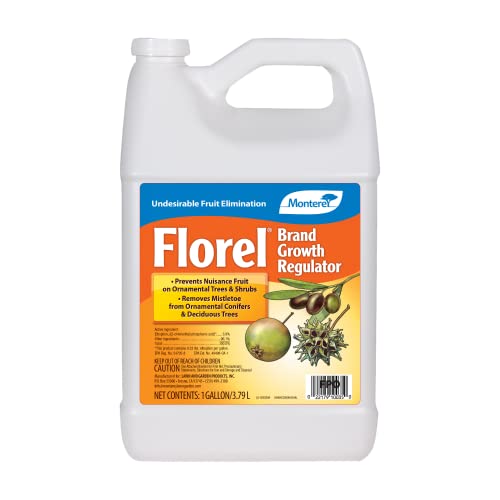How To Stop Olive Trees From Fruiting In 5 Simple Steps
Olive Knowledge is a part of Amazon Associates. As an Amazon Associate, we earn from qualifying purchases. Read our Affiliate Disclosure to learn more.
While I’m a big fan of olive trees that bear fruit, I know that there are many people who love olive trees because of their looks, and they don’t need those trees to bear fruits at all. While there are fruitless olive trees, most varieties still bear fruit every year, and that can be prevented.
In this post, I’ll show you the exact steps you should take to prevent olives from bearing fruit.
How To Stop Olive Tree From Fruiting:
- Ensure olive trees are healthy and stress-free before treatment.
- Spray trees with a growth regulator like Florel Brand Growth Regulator.
- Apply the regulator during the mid to full blooming stage, in late spring or early summer.
- Check the weather forecast: avoid application if rain is expected within 24 hours or if temperatures are extreme.
- Mix solution correctly: 3.2 oz of regulator per 1 gallon of water.
5 Steps To Stop Olive Trees From Fruiting

Let’s see the exact steps you should take to prevent your olive trees from producing olives this season.
1. Make Sure That Olive Tree Is Healthy
Before you decide to prevent an olive tree from bearing fruits, you should first make sure that the tree is healthy, without any stresses (droughts, diseases, insects).
To safely force the tree to stop bearing olives, it should be in the best possible condition. Otherwise, the tree can suffer some damage, such as defoliation and other tree injuries.
Related: Common Olive Tree Diseases
2. Buy Olive Growth Regulator
In order to stop olive trees from producing olives, you’ll have to treat them with some specific solutions. The best product on the market is Florel Brand Growth Regulator
When used properly, plant growth regulators eliminate undesirable fruit from the trees, and by choosing the product above, you won’t make a mistake. Another important thing, these regulators will reduce the amount of pollen olive trees produce, which helps people with allergies to have fewer symptoms.
3. Pick The Right Time For Application
To get the best outcome, you should apply the solution in a specific time period. Growth regulators should be applied to olive trees at the mid to the full blooming stage before the flowers start to form the fruit. It’s usually in late spring to early summer.
That way, it’ll be most effective, and you’ll be able to completely stop an olive tree from producing fruits.
Furthermore, make sure that there won’t be any rain 24 hours after application and that temperatures aren’t too hot or cold (above 100 degrees Fahrenheit or below 60 degrees Fahrenheit). So, check the forecast before spraying the tree with a solution.
4. Mix The Growth Regulator With Water
The proper solution mix is extremely important. If the mixture is too diluted, it won’t work. On the other hand, if it’s too concentrated, it may damage the tree.
Here’s the ideal dilution ratio for the Florel Brand Growth Regulator:
- Add 3.2 oz of growth regulator per 1 gallon of water
I suggest you mix 32 oz with 10 gallons of water. That’s usually enough to apply a regulator to 1-2 trees, depending on their size. Pour the mixture into a garden sprayer, and you’re ready to go.
If you decide to use some other growth regulators, make sure to check dilution ratios for that exact product since they can differ from product to product.
5. Spray The Tree

Now, it’s time to apply the growth regulator to the tree. The parts of the tree you should spray are blooms.
Make sure to thoroughly spray blooms until they’re wet, but not to round off.
Spraying too much growth regulator may dry the leaves and make them fall. Also, make sure to wear a mask during application. After you have sprayed the whole tree, you’re finished, and nothing else should be done.
Do Growth Regulators Really Work?
Yes, these products really work, but to make them work, you should strictly follow the guidelines in product descriptions, and you should only use proper dilution ratios.
Sometimes, small fruit production will still happen, but that won’t be many fruits.
Are They Safe?
As long as you follow the manufacturer’s instructions and the tree is healthy, this method is completely safe, even for extremely old trees.
Occasionally, a temporary yellowing or falling of the leaves will happen, but it’s nothing dangerous for the plant.
If there are some other plants near olive trees, and you want them to grow and produce fruit, make sure not to accidentally spray them. If you still do that, make sure to wash them with plenty of water as soon as you finish applying the fruit eliminator on the tree.
Conclusion
And that’s it! Now, you know an extremely easy way of eliminating olive fruit production. The best thing about this method is that it’s not permanent, so if you decide to grow fruits next year, you’ll be able to do it.
There are also some other ways to prevent olive trees from bearing fruit (pruning some specific branches), but in my opinion, the way I showed you above is much simpler, quicker, and more effective.
I also suggest you check fruitless olive trees (if you’re growing olive trees for landscape purposes only). They naturally won’t produce fruit, and you won’t have to deal with fruit elimination products.

